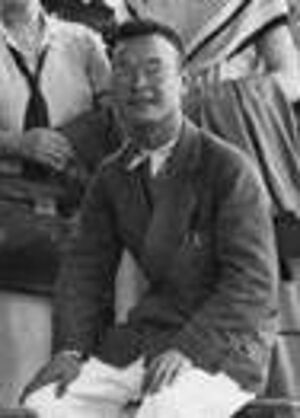Chiungtze C. Tsen (nonfiction)
Chiungtze C. Tsen (Chinese: 曾炯之; pinyin: Zēng Jiǒngzhī; Wade–Giles: Tseng Chiung-chih, April 2, 1898 – October 1, 1940) was a Chinese mathematician.
Biography
Tsen was born in Nanchang, Jiangxi,
He was one of Emmy Noether's students at the University of Göttingen. He returned to China in 1935. After the full-scale Japanese invasion of China in 1937, he fled and eventually settled in Xikang, where he became a professor at the newly-founded National Xikang Institute of Technology. He died of a stomach ulcer in Xichang, Xikang on October 1, 1940, and a memorial service was held on November 18, 1940. (Many Chinese sources mistakenly give his date of death as November 1940.)
Career
One of his research interests was quasi-algebraic closure. In that area, in 1933 he proved Tsen's theorem, which states that a function field K of an algebraic curve over an algebraically closed field is quasi-algebraically closed (i.e., C1). This implies that the Brauer group of any such field vanishes, and more generally that all the Galois cohomology groups H i(K, K*) vanish for i ≥ 1. This result is used to calculate the étale cohomology groups of an algebraic curve.
In 1936 he introduced the Tsen rank of a field, describing conditions under which a system of polynomial equations must have a solution in the field.
He proved Tsen's theorem.
In the News
Fiction cross-reference
Nonfiction cross-reference
External links
- Chiungtze C. Tsen @ Wikipedia
- Tsen rank @ Wikipedia
- Tsen's theorem @ Wikipedia
